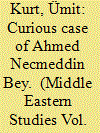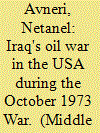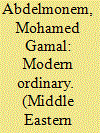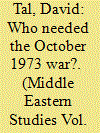|
|
|
Sort Order |
|
|
|
Items / Page
|
|
|
|
|
|
|
| Srl | Item |
| 1 |
ID:
145805


|
|
|
|
|
| Summary/Abstract |
Ahmed Necmeddin Bey was the kaimakam (district governor) of Aintab in late July 1908. One day, however, Ahmed Necmeddin Bey was beaten by a group of Turks and Armenians in Aintab; his clothes torn, he was dismissed from his post and finally expelled him from the city. But what was the reason for this incident? Within the first year of the declaration of the Constitution, it was the most important event that occurred in the city. This particular incident calls for careful examination, for this significant event reflects how the Second Constitutional era and the new regime were perceived by Muslims and Armenians in Aintab on a local level. Additionally, it offers us some useful clues regarding how the Union and Progress Party as a political organization and its policies were received on a local scale. By studying this case, it is also possible to see a clear example of how ordinary Ottoman citizens reacted towards the revival of the Constitution.
|
|
|
|
|
|
|
|
|
|
|
|
|
|
|
|
| 2 |
ID:
145803


|
|
|
|
|
| Summary/Abstract |
This article examines an important source of social unrest in Ottoman ports where ships could not be tied directly to the quays. In such places, boatmen ferried goods and passengers between the shore and ships that anchored offshore. Many of these boatmen wanted to work on the queue system because it provided work and income security to them. However, merchants and a few boatmen viewed this system as a major obstacle for their business to survive and grow. The Ottoman government also took part in this debate. However, rather than acting as a unitary actor, various components of the government adopted different positions on the issue. In the early twentieth century, these actors with different views and goals were involved in a series of conflicts. These conflicts forced Ottoman ruling elites to change their policies about the boat queue system several times at least but did not result in a decisive victory for one side or the other.
|
|
|
|
|
|
|
|
|
|
|
|
|
|
|
|
| 3 |
ID:
145802


|
|
|
|
|
| Summary/Abstract |
While the October 1973 War has been studied from many angles, the Iraqi–American perspective has never been fully investigated. During this war the Bacth regime in Iraq felt compelled not only to send forces to the front, but also to harm American oil interests. As Washington was trying to mitigate the militant situation and prevent the imposition of an oil embargo, Baghdad continuously adopted a confrontational anti-American, anti-Israeli stance. This article uncovers evidence to show that while the Bacth regime did indeed attack American interests, it only did so in ways that would not endanger Iraqi stability and economic interests. The article is based mainly on US National Archives documents, as well as on Iraqi sources.
|
|
|
|
|
|
|
|
|
|
|
|
|
|
|
|
| 4 |
ID:
145800


|
|
|
|
|
| Summary/Abstract |
The article focuses on the internal debate in the US Administration as Israel Approached and passed the Nuclear threshold in 1968–1969. The article is based on recently released American Defense and State Departments documents and also on Presidential and National Security Advisor documents hitherto unavailable.
|
|
|
|
|
|
|
|
|
|
|
|
|
|
|
|
| 5 |
ID:
145806


|
|
|
|
|
| Summary/Abstract |
Having experienced social and political structures of the nineteenth century Europe, western-educated Egyptian elite used public institutions to force new legislative structures and procedures that ruled out traditional housing forms and spatial systems. This essay detects direct and indirect impact of these changes that informed the spatial change of modern living in Egypt in the first quarter of the twentieth century. It offers analysis of socio-spatial practices and change in ordinary Cairenes’ modes of everyday living, using social routine and interaction to explain spatial systems and changing house forms during the first quarter of the twentieth century. In doing so, the essay utilized archival documents, accounts, formal decrees and novels of the time as well as conducting survey of house forms and spatial organizations in Old Cairo.
|
|
|
|
|
|
|
|
|
|
|
|
|
|
|
|
| 6 |
ID:
145807


|
|
|
|
|
| Summary/Abstract |
Banditry has been endemic across the Middle East and North Africa. Yet the Middle Eastern experience of banditry has thus far failed to receive sustained academic attention. In particular, the debates stimulated by Eric Hobsbawm's thesis of social banditry have elicited only a few responses from scholars of the Middle East and North Africa, and these largely negative. This article asks to what extent the recent work done in the field of ‘Bandit studies’ helps to elucidate the experience of the Middle East and North Africa. Why has there been such a lack of interest in banditry when the phenomenon itself, and rural crime in general, was so widespread? Why are so few individual bandits celebrated or reviled? What do we mean by banditry in the Middle Eastern context, who became a bandit, why and in what circumstances, what did bandits do and how was this perceived by elites and subalterns, what were the connections between bandits and peasants and between bandits and the worlds of power and, perhaps most importantly, who has written about bandits and what sources have they used?
|
|
|
|
|
|
|
|
|
|
|
|
|
|
|
|
| 7 |
ID:
145801


|
|
|
|
|
| Summary/Abstract |
Scholars and pundits believe that Anwar Sadat went to war in October 1973 because Israel left him no choice. The Israeli government rejected his peace proposals during 1971–73, and Sadat initiated the war in order to demonstrate his refusal to agree to the status quo and to the continuation of the Israeli occupation of the territories it occupied in June 1967. However, when the peace treaty signed between Israel and Egypt in March 1979 is carefully studied, it appears the terms of the treaty were in fact much closer to the Israeli position and terms as presented before the 1973 war than to those set by Sadat. Careful reading of the relevant documents in general and Sadat's claims and arguments in particular will show that it was actually Sadat who needed the war, and he needed it not in order to force Israel into a political process, but for himself, so as to accept terms he could not accept without a war.
|
|
|
|
|
|
|
|
|
|
|
|
|
|
|
|
| 8 |
ID:
145804


|
|
|
|
|
| Summary/Abstract |
The article deals with the Zarnuqa incident which took place on 23 July 1913 between the colonists and guards of Rehovot, and the Arab rural population in their vicinity, an incident which is considered by historians as a milestone in Zionist–Arab relations in late Ottoman Palestine. The aim of the article is to present the various narratives available to researchers today, starting with the various Jewish sources, then examining the Arabic sources and, finally, external ones. We analyse each of the sources and draw general conclusions about the sources historians can use today when studying this formative period of Zionist–Arab early encounters. The decision to examine several different narratives provides a multidimensional perspective on the event. Our aim is not to determine whose narrative is closer to historical reality (which would certainly be elusive), or to find out who started the fight and who is to be blamed but rather to present the different narratives, how each side described the event, and what the narrators chose to emphasize and what to omit. The article illustrates the difficult task facing historians dealing with late Ottoman Palestine, the period of the early Zionist–Arab encounter and conflict.
|
|
|
|
|
|
|
|
|
|
|
|
|
|
|
|
|
|
|
|
|